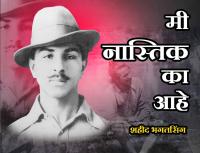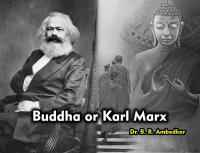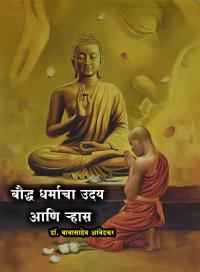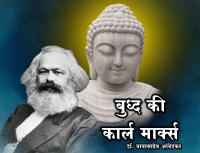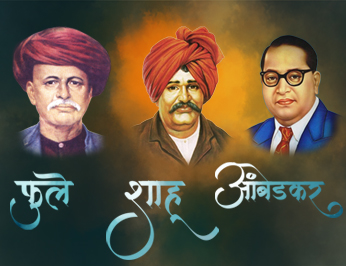 फुले - शाहू - आंबेडकर
फुले - शाहू - आंबेडकर Phule Shahu Ambedkar
Top Books
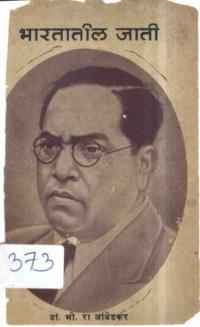
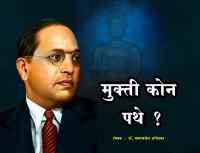
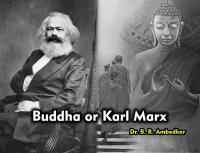
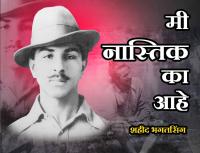
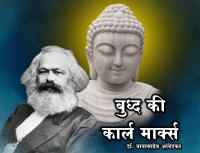
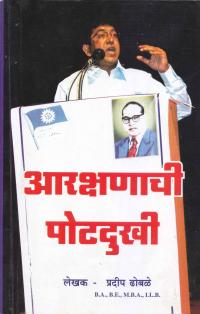

Top News
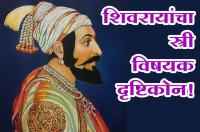
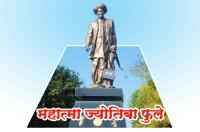
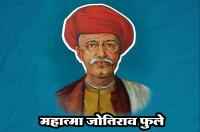

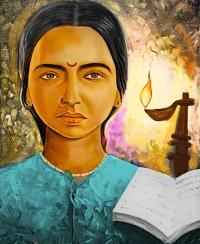
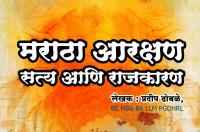
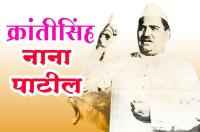
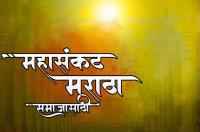
Labels
Satyashodhak, obc, Mahatma phule, Rajarshi Chhatrapati shahu maharaj, dr Babasaheb Ambedkar, Periyar, Bahujan, Shahid Bhagat Singh, Krantisinh Nana Patil, Mahatma Gandhi , Karl Marx, Gautama Buddha, Indian National Congress, Buddhism, Mandal commission, Vishwanath Pratap Singh, Bharatiya Janata Party, rashtriya swayamsevak sangh, Republican Party of India, Savitri Mata Phule,Introduction to Dreamland - Bhagat Singh
written by - Bhagat Singh
[Lala Ram Saran Das was convicted for life in 1915 in the first Lahore Conspiracy Case. While in Salem Central Prison, Madras presidency, he wrote a book in verse entitled Dream. After his release in the mid-twenties he contacted Bhagat Singh and Sukhdev and became active in the HSRA. He was arrested again in connection with the second LCC. This time he wavered and accepted king's pardon. Soon he realised the mistake and retracted his statement. He was charged of perjury and convicted for two years which was subsequently reduced to six months in appeal. It was during this conviction that he passed on his manuscript to Bhagat Singh for an introduction. In this article Bhagat Singh, while appreciating the spirit behind Ram Saran Das's work, has criticised his utopian approach to the problems of revolution. He has also expressed himself on such subjects as God, religion, violence and non-violence, spiritualism, literature, poetry, etc. ]
My noble friend, L. Ram Saran Das, has asked me to write an introduction to his poetical work, 'The Dreamland'. I am neither a poet nor a literature, neither am I a journalist nor a critic. Hence, by no stretch of imagination can I find the justification of the demand. But the circumstances in which I am placed do not afford any opportunity of discussing the question with the author arguing back and forth, and thereby do not leave me any alternative but to comply with the desire of my friend.
As I am not a poet I am not going to discuss it from that point of view. I have absolutely no knowledge of metre, and do not even know whether judged from metrical standard it would prove correct. Not being a literature I am not going to discuss it with a view of assigning to it its right place in the national literature.
I, being a political worker, can at the utmost discuss it only from that point of view. But here also one factor is making my work practically impossible or at least very difficult. As a rule the introduction is always written by a man who is at one with the author on the contents of the work. But, here the case a quit different. I do not see eye to eye with my friend on all the matters. He was ware of the fact that I differed from him on many vital points. Therefore, may writing is not going to be an introduction at all. It can at the utmost amount to a criticism, and its place will be at the end and not in the beginning of the book.
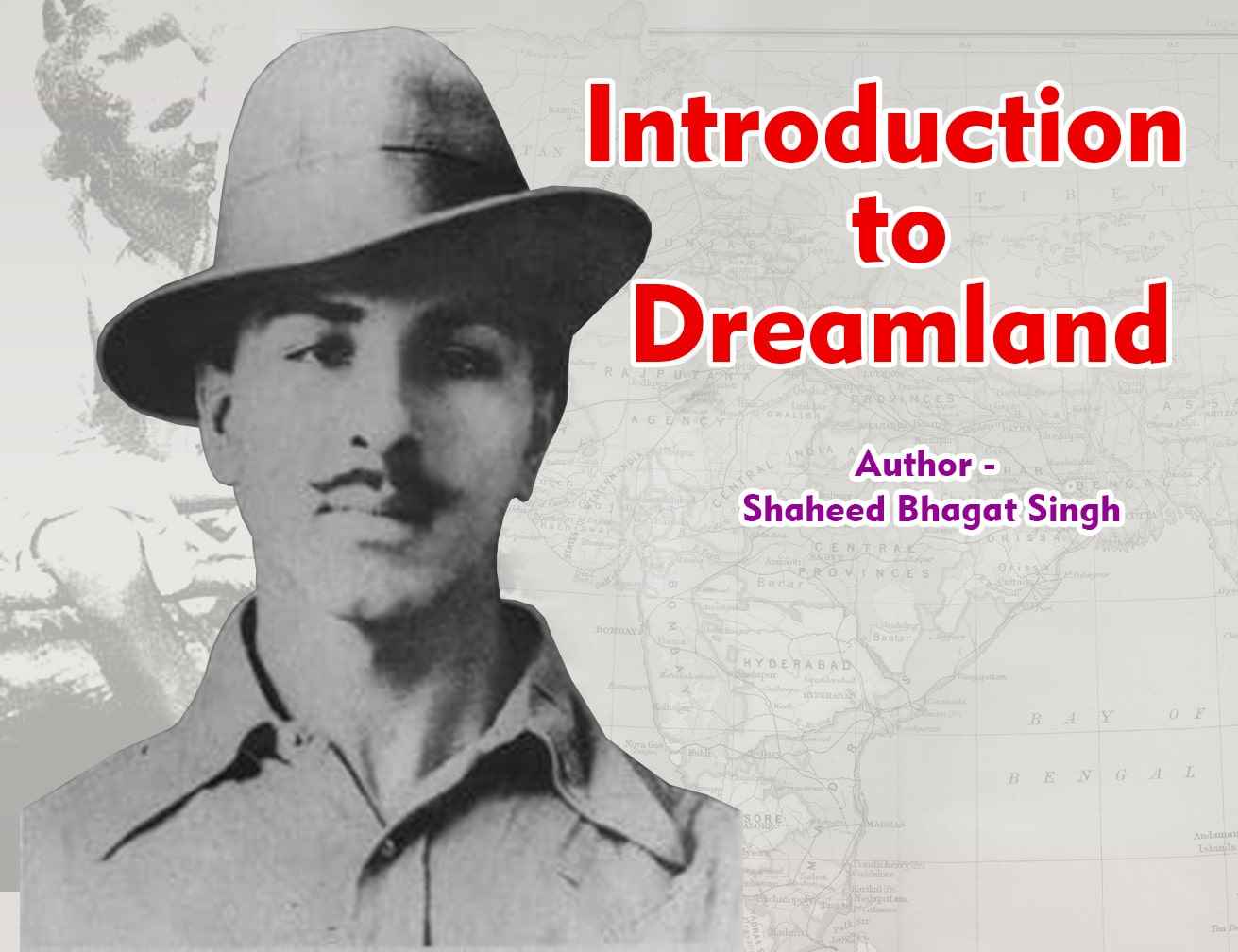 In the political field 'The Dreamland' occupies a very important place. In the prevailing circumstance it is filling up a very important gap in the movement. As a matter of fact all the political movements of our country that have hitherto played any important role in our modern history, had been lacking the ideal at the achievement of which they aimed. Revolutionary movement is no exception. In spite of all my efforts, I could not find any revolutionary party that had clear ideas as to what they were fighting for, with the exception of the Ghadar Party which, having been inspired by the USA form of government, clearly stated that they wanted to replace the existing government by a Republican form of government. All other parties consisted of men who had but one idea, i.e., to fight against the alien rulers. That idea is quite laudable but cannot be termed a revolutionary idea. We must make it clear that revolution does not merely mean an upheaval or a sanguinary strife. Revolution necessarily implies the programme of systematic reconstruction of society on new and better adapted basis, after complete destruction of the existing state of affairs (i.e., regime).
In the political field 'The Dreamland' occupies a very important place. In the prevailing circumstance it is filling up a very important gap in the movement. As a matter of fact all the political movements of our country that have hitherto played any important role in our modern history, had been lacking the ideal at the achievement of which they aimed. Revolutionary movement is no exception. In spite of all my efforts, I could not find any revolutionary party that had clear ideas as to what they were fighting for, with the exception of the Ghadar Party which, having been inspired by the USA form of government, clearly stated that they wanted to replace the existing government by a Republican form of government. All other parties consisted of men who had but one idea, i.e., to fight against the alien rulers. That idea is quite laudable but cannot be termed a revolutionary idea. We must make it clear that revolution does not merely mean an upheaval or a sanguinary strife. Revolution necessarily implies the programme of systematic reconstruction of society on new and better adapted basis, after complete destruction of the existing state of affairs (i.e., regime).
In the political field the liberals wanted some reform under the present government, while the extremists demanded a bit more and were prepared to employ radical means for the same purpose. Among the revolutionaries, they had always been in favour of extreme methods with one idea, i.e., of overthrow the foreign domination. No doubt, there had been some who were in favour of extorting some reforms through those means. All these movement cannot rightly be designated as revolutionary movement.
But L. Ram Saran Das is the first revolutionary recruited formally in the Punjab by a Bengali absconder in 1908. Since then he had been in touch with the revolutionary movements and finally joined the Ghadar Party but retaining his old ideas that people held about the ideal of their movement. It has another interesting fact to add to its beauty and value. L. Ram Saran Das was sentenced to death in 1915, and the sentence was later on commuted to life transportation. Today, sitting in the condemned cells myself, I can let the readers know as authoritatively that the life imprisonment is comparatively a far harder lot than that of death. L. Ram Saran Das had actually to undergo fourteen years of imprisonment. It was in some southern jail that he wrote this poetry. The then psychology and mental struggle of the author has stamped its impressions upon the poetry and makes it all the more beautiful and interesting. He had been struggling hard against some depressing mood before he had decided to write. In the days when many of his comrades had been let off on undertakings and the temptation had been very strong for everyone and for him, too and when the sweet and painful memories of wife and children had added more to the work. Hence, we find the sudden outburst in the opening paragraph:
"Wife, children, friends that me surround
Were poisonous snakes all around."
He discusses philosophy in the beginning. This philosophy is the backbone of all the revolutionary movement of Bengal as well as of the Punjab. I differ from him on this point very widely. His interpretation of the universe is teleological and metaphysical, which I am a materialist and my interpretation of the phenomenon would be causal. Nevertheless, it is by no means out of place or out of date. The general ideal that are prevailing in our country, are more in accordance with those expressed by him. To fight that depressing mood he resorted to prayers as is evident that the whole of the beginning of the book is devoted to God, His praise, His definition. Belief in God is the outcome of mysticism which is the natural consequence of depression. That this world is 'Maya' or Mithya', a dream or a fiction, is clear mysticism which has been originated and developed by Hindu sages of old ages, such as Shankaracharya and others. But in the materialist philosophy this mode of thinking has got absolutely no place. But this mysticism of the thinking has got absolutely no place. But this mysticism of the author is by no means ignoble or deplorable. It has its own of them are doing very productive labour. The only difference that the socialist society expects is that the mental workers shall no longer be regarded superior to the manual workers shall no longer be regarded superior to the manual workers.
L. Ram Saran Das's idea about free education is really worth considering, and the socialist government has adopted somewhat the same course in Russia.
His discussion about crime is really the most advanced school of thought. Crime is the most serious social problem which needs a very tactful treatment. He has been in jail for the better part of his life. He has got the practical experience. At one place he employs the typical jail terms, 'the light labour, the medium labour and the hard labour', etc. Like all other socialists he suggests that, instead of retribution, i.e., retaliation the reformative theory should form the basis of punishment. Not to punish but to reclaim should be the guiding principle of the administration of justice. Jails should be reformatories and not veritable hells. In this connection the readers should study the Russian prison system.
While dealing with militia he discusses war as well. In my opinion war as an institution shall only occupy a few pages in the Encyclopaedia then, and war materials shall adorn the no conflicting or diverse interests that cause war.
At the utmost we can say that war shall have to be retained as an institution for the transitional period. We can easily understand if we take the example of the present-day Russia. There is the dictatorship of the proletariat at present. They want to establish a socialist society. Meanwhile they have to maintain an army to defend themselves against the capitalist society. But the war-aims would be different. Imperialist designs shall no more actuate our dreamland people to wage wars. There shall be no more war trophies. The revolutionary armies shall march to other lands not to rulers down from their thrones and stop their blood-sucking exploitation and thus to liberate the toiling masses. But, there shall not be the primitive national or racial hatred to goad our men to fight.
World-federation is the most popular and immediate object of all the free thinking people, and the author has well dilated on the subject, and his criticism of the so-called League of Nations is beautiful.
In a footnote under stanza 571 (572) the author touches, though briefly, the question of methods. He says: "Such a kingdom cannot be brought about by physical violent revolutions. It cannot be forced upon society from without. It must grow from within. . . . This can be brought about by the gradual process of Evolution, by educating the masses on the lines mentioned above", etc. This statement does not in itself contain any discrepancy. It is quite correct, but having not been fully explained, is liable to crate some misunderstanding, or worse still, a confusion. Does it mean that L. Ram Saran Das has realised the futility of the cult of force? Has he become an orthodox believer in non-violence? No, it does not mean that.
Let me explain what the above quoted statement amounts to. The revolutionaries know better than anybody else that the socialist society cannot be brought about by violent means, but that it should grow and evolve from whitin. The author suggests education as the only weapon to be employed. But, everybody can easily realise that the present government here, or, as a matter of fact, all the capitalist governments are not only not going to help any such effort, but on the contrary, suppress it mercilessly. Then, what will his 'evolution' achieve? We the revolutionaries are striving to capture power in our hands and to organize a revolutionary government which should employ all its resources for mass education, as is being done in Russia today. After capturing power, peaceful methods shall be employed for constructive work, force shall be employed to crush the obstacles. If that is what the author means, then we are at one. And I am confidant that it is exactly this what he means.
I have discussed the book at great length. I have rather criticised it. But, I am not going to ask any alteration in it, because this has got its historical value. These were the ideas of 1914-15 revolutionaries.
I strongly recommend this book to young men in particular, but with a warning. Please do not read it to follow blindly and take for granted what is written in it. Read it, criticise it, think over it, try to formulate your own ideas with its help.

फुले शाहु आंबेडकर

फुले शाहु आंबेडकर

फुले शाहु आंबेडकर

फुले शाहु आंबेडकर
You might like This Books -
